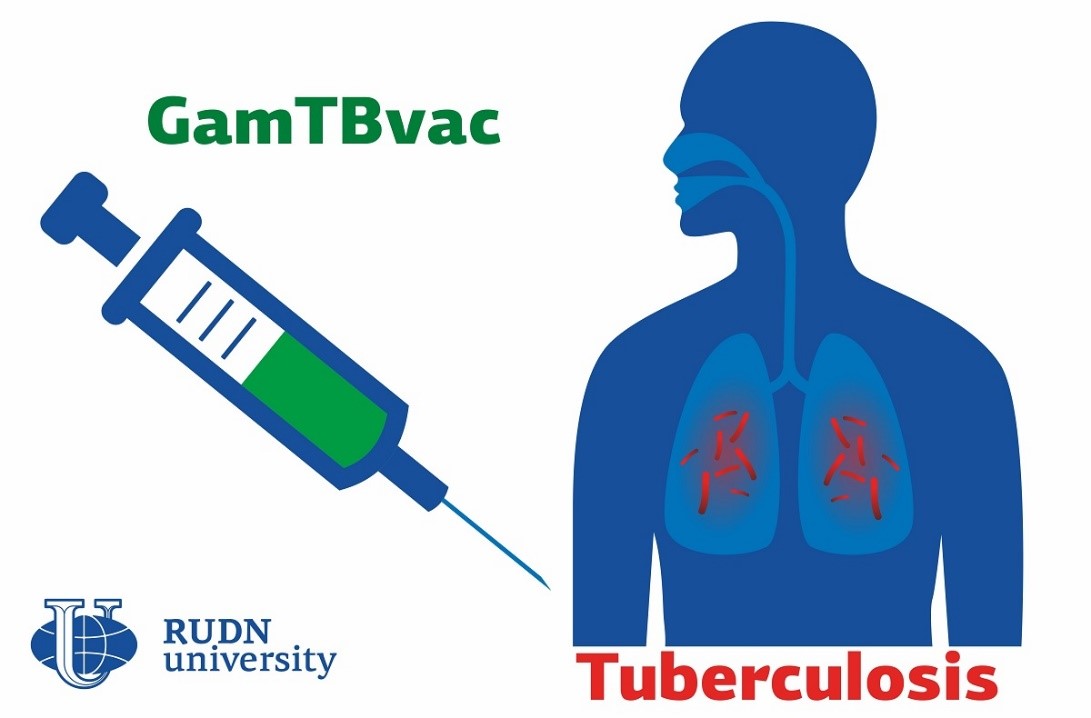RUDN researchers test a new TB vaccine

Every year, Mycobacterium tuberculosis infects 10 mln and kills 1.4 mln people which makes prevention and treatment of tuberculosis one of the priority goals of the World Health Organization. Currently, the main weapon against tuberculosis is the BCG vaccine that prevents tuberculous meningitis and miliary tuberculosis. However, it is still unable to protect us from all forms of the disease. Moreover, for unknown reasons, it can be less effective in some populations than in others. A medic from RUDN University together with his colleagues conducted a clinical trial of a new TB vaccine that is supposed to enhance the immunity acquired after BCG vaccination.
“GamTBvac is a TB vaccine that contains three antigene fragments of Mycobacterium tuberculosis. It is these elements that our immune system is expected to react to in order to develop immunity. For better stability, the fragments are bound with a dextran-binding domain—a fragment of proteins taken from the bacterium Leuconostoc mesenteroides. The vaccine also contains an adjuvant, that is, an additional substance that enhances the immune response. The adjuvant contains dextran, diethylaminoethyl dextran, and oligodeoxynucleotides,” said Prof. Sergey Fitilev, MD, from the Department of General and Clinical Pharmacology, RUDN University.
In total, there are 14 alternative vaccines in development in the world that could act independently or in combination with the BCG vaccine. Among them are weakened strains of human or bovine tuberculosis bacillus, DNA vaccines and recombinant subunit vaccines. The GamTBvac that the RUDN medic experienced belongs to the latter type. Previously, doctors on 60 volunteers have already demonstrated the safety of this drug and have shown that half the dosage causes a high and stable immune response and is easily tolerated by patients. The second phase of clinical trials consists of double-blind randomized placebo-controlled trials on 180 participants. All participants had previously received the BCG vaccine.
The volunteers were twice injected with 0.5 ml of the vaccine or placebo subcutaneously with an interval of eight weeks. The double-blind type of study means that until the end of the trial, neither patients nor doctors know who got into the vaccine group and who received a placebo. This avoids subjective interpretations of the result. After vaccination, doctors took a blood test from patients eight times and studied their immune response between the 14th and 150th day after vaccination. The level of gamma interferon immune proteins turned out to be maximum on day 21, and by day 150 it was twice the level before vaccination. The level of antibodies in patients increased by 78 days after vaccination. 94%-98% had an immune response to fragments of Mycobacterium tuberculosis bacillus. Although the results do not yet show whether this is enough to protect against the disease, they will be the basis for further testing.
The results of the study were published in Vaccines.
Matilda Pavlovna Mityaeva was born in 1925. In November 1942, she volunteered for frontline duty. She participated in the Great Patriotic War from November 1942 to June 1945 as part of the 53rd Infantry Division of the 475th Infantry Regiment. She was wounded twice.
The team led by Sergey Zyryanov, Head of the Department of General and Clinical Pharmacology, became the winner of the All-Russian competition of scientific projects "Technologies for Human Health".
RUDN University constantly adapts to the changes of the modern world and responds to challenges flexibly. This allows us to keep the standard of a world-class research university. The sphere of science is no exception. Peter Dokukin, Head of the Research Division, presented the updated R&D Programme at the meeting of the RUDN University Academic Council.
Matilda Pavlovna Mityaeva was born in 1925. In November 1942, she volunteered for frontline duty. She participated in the Great Patriotic War from November 1942 to June 1945 as part of the 53rd Infantry Division of the 475th Infantry Regiment. She was wounded twice.
The team led by Sergey Zyryanov, Head of the Department of General and Clinical Pharmacology, became the winner of the All-Russian competition of scientific projects "Technologies for Human Health".
RUDN University constantly adapts to the changes of the modern world and responds to challenges flexibly. This allows us to keep the standard of a world-class research university. The sphere of science is no exception. Peter Dokukin, Head of the Research Division, presented the updated R&D Programme at the meeting of the RUDN University Academic Council.